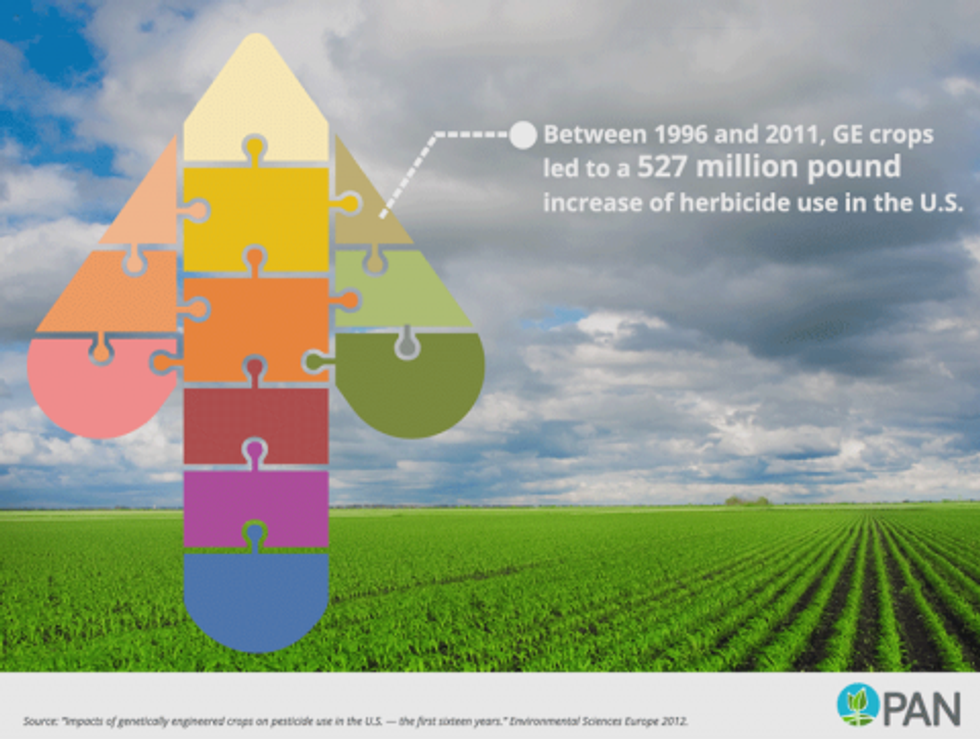Part two, here we go! Last week we covered the basics, this week we'll dive in a little deeper. if you missed part one, check it out here!
Why not have both?
Some might wonder why we can't just be happy with GMOs and non-GMOs, and let consumers and farmers make their own choices about them. There are a few problems with this idea.
Problem 1: Labeling
GMOs reached grocery store shelves in 1994 with the introduction of the Flavr Savr tomato, a tomato modified to "stay ripe longer." By 1997, the European Union passed laws mandating the labeling of foods that contained genetically modified ingredients, and it even required labeling on animal feed. A mere twenty-two years later and the U.S.justpassed a GMO-Labeling bill, and it still falls short (more on that next week).
The issue of GMO labeling is bigger than you might initially think, yes we want labels so that we can be aware of what's in our food, but it's a bit bigger than that.
It is estimated that about 80% of the food we consume in North America is made at least partially with genetically modified ingredients. I'll state the obvious here, that's a huge portion, and it's only an estimate, because without labels we can't really be sure. To me, lack of labeling means lack of accountability.
Accountability is key to our safety
If at some point science determines that maybe GMOs aren't that safe to consume after all, we would have no way of knowing which of our foods contained them. "But...Leesh, you said last week that studies show they're safe to consume!" True, but I remain skeptical.
The thing about studies is that they're performed by people, and the thing about people is they can be persuaded by money, and the thing about money is that the companies that develop and sell GMOs have tons of it. Don't get me wrong, I'm not saying that these studies are rigged, I'm just saying it's totally possible. It wouldn't be the first time, take the times that Coca-cola paid scientists to "prove" that there's no correlation between sugary drinks and weight gain for example.
On top of that, I find it hard to believe that any experiment can deem something safe for human consumption without question, when it hasn't even existed as long as an average human lifespan.
The newest adventure in genetic-modification: GMO animals, like the GMO salmon I mentioned last week, has only just begun. In 2009, the FDA established the very first set of standards for regulation of GMO animals, and in 2010 the FDA, and a veterinary medicine committee decided that GMO salmon was safe to eat. That's all it takes? Just one year can determine whether or not something is safe for human consumption? Like I said, I'm skeptical.
Without labeling, we don't know if we have or have not consumed GMOs (you almost definitely have), and without that information there's no accountability, and no way of making a correlation between the consumption and any possible result in the future.
Another reason to be suspicious: All the big companies associated with GMOs have been funneling millions of dollars into anti-labeling efforts.
Problem 2: Cross-Fertilization
Cross-fertilization (contamination) is a natural phenomenon that occurs via wind, or insect pollination between plants. The radius for cross-fertilization can be as large as five miles. This means if a farmer operates an organic farm and his neighbor operates a GMO farm, the organic plants could gain genetically-modified genes just from being nearby. This phenomenon often referred to as GMO-contamination results in unintentional, unregulated GMO production, which brings us right back to the accountability concern. If a farmer doesn't even know he's producing them, how can we ever hope to trust the labels if, and when they ever come to the U.S.
This can also threaten the existence of non-GM crops as we know them, if the cross-fertilization is not kept under control.
Problem 3: The Corporations
Monsanto, Dow, BASF, Bayer, Syngenta and DuPont aka "The Big 6" literally rule the world's entire proprietary seed, agrichemical, and biotech industries. Which means that they have the most money, and the most influence on the world's agriculture as a whole. If you were thinking that this influence might be used for good, think again. "The Big 6" is all about the money, and costs to our health and the environment are of little concern to them. It's a genius business plan, really. The companies that develop the GMOs that are meant to be used with herbicides, and pesticides also make the herbicides and pesticides.
Critics of these companies have spread a lot of narratives about them, and like many rumors some are false, and some are true. My issue with these companies is that they have too much power, and they are heavily involved in paying to encourage that legislation falls in their favor. There is no doubt that these companies have provided vast amounts of beneficial scientific advancements, and GMOs could very well be an example of these, but their practices as a whole are monopolistic, deceitful, and a threat to the long-term health of our environment.
Better Safe Than Sorry?
I've read books, and articles, I've watched documentaries, and listened to Podcasts, I really never take anything at face-value, and my personal conclusions have always been that maybe it would be better to be safe, than to be sorry. I don't make myself crazy about it, but I do try to avoid GMOs whenever possible.
Coming Up Next
Next week I'll give you the low-down on the recent GMO-labeling law that was passed, and I'll give you the basics on how to avoid GMOs (if you want to).
In the meantime, if you like this topic I highly recommend you follow the Environmental Working Group, and/or check out the book The World According to Monsanto by Marie-Monique Robin.
Thank you for reading! Feel free to leave comments or questions below!

































